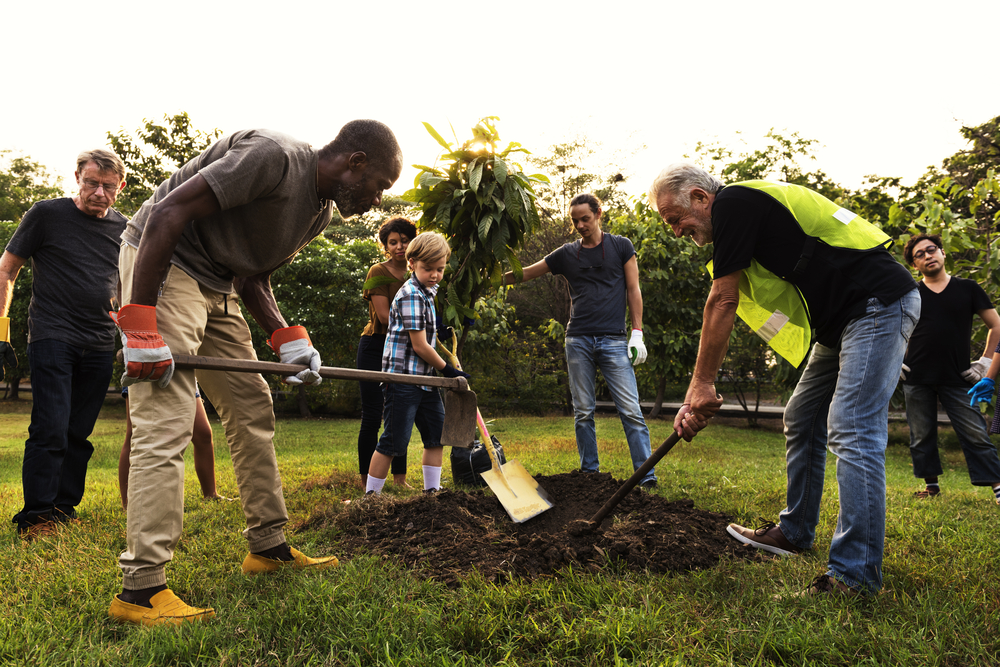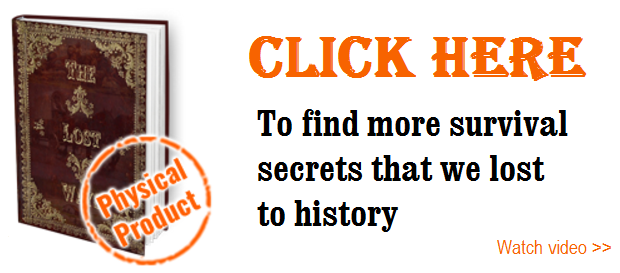There are many different viewpoints about surviving a cataclysmic event. Survival plans are as individual as the people who create them. That’s not surprising, as we are all individuals with individual needs. My survival plan might not work for your family’s needs, and your survival plan might not work in my situation. So we all try to learn from each other and do the best we can.
Somebody asked a question the other day, which got me thinking. Their question was, “What do rich people do?” While I can’t claim to know many wealthy people or have surveyed their survival plans, we do see some advertisements and articles online, from time to time, which give us a window into what those with more money than us have planned, for when everything falls apart. I’m sure you’ve seen them too.
The articles talk about million-dollar survival bunkers, built into nuclear missile silos, multi-millionaires who have built survival shelters on private islands, and the specific references in high-tech to their bug-out shelters in “New Zeeland.”
There are a few key things that I think we can derive from the information that has come out:
- The biggest potential disaster that the wealthy are concerned about is social unrest, not any of the disasters we’re worried about. They want someplace where they can escape from angry mobs.
- These wealthy people aren’t planning on bugging out to a remote survival retreat, where they’ll be alone; they’re planning to be with others. Granted, they’re used to paying others to do things for them, but they’re also planning on a joint effort at defense, as well as having others to be in a relationship with.
- Since their survival retreats are so far from society, it’s safe to say that they are planning on bugging out early, at the first clue that a disaster is about to hit.
- The survival retreats these people are investing in are working now to build food production, operate under off-grid power, and harvest water from nature, rather than waiting until a disaster strikes.
While I can’t say that I agree with everything these people are doing, nor do I believe that buying an apartment in one of those underground bunkers is the best possible investment, I can still see a few things they’re doing the rest of us need to consider.
Building a Survival Community
Several months back, I wrote about the problems with survival teams. One of the main things I mentioned was that most survival teams I’ve seen are scattered across town. This problem is one that the wealthy seem to have overcome. By investing in their underground survival condominiums, they’ve ensured that they are part of a survival community. Whether or not those people have any helpful survival skills is another issue entirely, but at least they’re together.
The thing is, if those people can build a survival community, we should be able to as well. I’m not just talking about a survival team that gets together once in a while to talk about their survival plans. I mean a team that works on surviving together and has the money to do so—more than anything, that means having a joint survival location.
That is different than just creating a survival team. First of all, the group of people you involve in this effort will probably have to be considerably larger. The cost of buying enough land to create a community is considerable. But in addition to that, you need more people than are in the typical team to create an actual community. Think about what functions a community needs to have to survive and plan on enough people eventually joining you to fulfill all those functions.
Hopefully, you’ll be able to find all those people before the disaster strikes; but if not, you may have to do some recruiting from the people who show up at your doorstep. Either way, you want to be careful about the types of people you let in. Skills are one thing, but the character is ultimately more important.
So just how do you do this?
Buy Homes in the Same Neighborhood
Probably the easiest way to make a survival community is to turn an existing community into one. No, I’m not talking about doing anything illegal. I’m talking about everyone in your survival team buying a property that’s in the same neighborhood or housing development. This is easiest to do when the development is under construction, but that’s not the only time possible. Find a community that has a high turnover of people selling their homes and start buying them.
Taking this idea a step further, you could buy homes in a community that people abandon because the homes are run down. That provides the added benefit of making the homes less costly to buy. Purchase those houses as fixer-uppers and put the work into them yourselves, turning that community around. Those who don’t sell out may just be encouraged to join in your efforts and then in your survival efforts as well.
If you can’t find any areas like that, look for a new development on the edge of town. Many developers don’t go any further in creating housing developments than dividing up the land, building roads, and bringing in utilities. Buying lots and making our own homes doesn’t cost more than purchasing pre-built homes unless we’re buying the fixer-uppers I mentioned a moment ago.
Create Your Own Rural Community
As an alternative to buying existing homes or lots, why not buy a larger piece of land, such as farmland sitting idle, and turn it into your community. Granted, that would be more work, but it would also be less expensive. Even with the added cost of bringing utilities into the property, it has to cost less than buying land ready for building on. Otherwise, it wouldn’t make much sense for developers to divide up the land they buy, bringing in the necessary infrastructure.
With that in mind, there’s no reason you and I can’t start from scratch, building a survival community on land that has been used for other things. Much of the land developers turn into housing developments is farmland, but that’s not the only land out there. If we’re willing to look in areas outside of town, we can find land all over the place.
Granted, creating everything else that goes with a community takes time and resources, but it doesn’t all have to be created at once. Concern yourselves with building homes and the necessary infrastructure for your community to thrive. The other things can come later.
Keep in mind that every town that exists started with just a few people building homes. Then people started building businesses to service the people living in those homes. The government, schools, churches, and everything else came along later as the community grew. So, raise the community as a survival community, and people within that community will make sure the rest comes when needed.
Buy Land to Build a Joint Survival Retreat
Taking another angle on that last idea, have your survival team purchase land to use as a survival retreat rather than as a community. The main difference here is that the focus won’t be building homes you can live in, but instead building survival shelters that you can go to, much like those rich people are planning on going to their underground bunker communities.
Of course, if someone in the team already has land, this cuts the cost considerably. Some agreement can be reached, where they allow the team to use their land. Perhaps in exchange for that, everyone who signs the deal will agree that anything they build on the land reverts to the property owners, should they decide to leave.
While this is a workable solution, it lacks the benefit of having everyone living full-time in your survival community. That limits the amount of work that people can do on their shelters and how much they can do o the infrastructure to help everyone survive. More than anything, it means that you are not using the systems you will depend on when you’re using that retreat to stay.
Find Remote Public Land that You Can Use
Even if you can’t come up with enough money to buy land for a combined survival retreat, that doesn’t mean that it is impossible to have a combined retreat or even a joint survival community. There’s a lot of public land in this country, the kind of wilderness land that preppers regularly talk about bugging out to. Your survival team can make plans to all bug out to the same area, on public land, where you can work together to survive.
To make this work as an actual survival community, everyone will have to have some mobile shelter. Whether that is a yurt, a travel trailer, or a more conventional trailer, it has to be something you can live in for an extended time. You should probably throw away the idea of building a shelter out of available materials unless you carry enough tools to create a log cabin. Even tents are iffy, as most won’t last all that long.
If things are bad enough to bug out as a community, you need to be ready to live as a community. In part, that means living like that for an extended period, not just a few weeks. So be sure to plan on a shelter that will last, even in inclement weather.
Prepare Your Infrastructure
Infrastructure is just as critical as shelter in any survival community. But since we’re talking about a survival community, we’re talking about a survival infrastructure as well. In other words, while we’re talking about water, we’re not necessarily talking about running water. While we’re talking about food, we’re not necessarily talking about buying food in a supermarket. As far as electric power is concerned, we’re probably going to assume that everyone will take care of that themselves.
The most important things we’ll need to survive in our community are heat, clean water, and food. Just providing that will be challenging enough. But it will be nearly impossible to do if we don’t plan and start building that infrastructure ahead of time.
One of the significant errors I see in survival planning is people planning on growing their food, but their vegetable garden can best be described as a postage stamp. Likewise, many people talk about using well water or rainwater capture but aren’t doing so now.
While I’m sure that most of us use more water than we can capture from rainwater, I’m also sure that we can catch enough rainwater to use for our gardening, saving us on our water bills. Not only that but capturing that rainwater will save us money while we’re ensuring that our systems are operating the way they are intended to.
Did you know that wells that are not regularly used will tend to close down by themselves? Having a well means making sure we’re using it too. If you’re not using your well, then it may not work when you need it to.
Worse than that, gardens require at least a year before they start producing well. So if all you’ve got is an 8’x 10′ garden, you’re going to be mighty hungry. You’ll be better off expanding that garden now, growing all your products so that you’ll have it working well when the time comes.
These are the types of projects that will need to be part of your survival community, whether you are living there or not. They’re also a large part of the reason why you want to be living where you’re going to be surviving. Just like we all plan on bugging in because our resources are at our homes, if you’re going to build a survival community, you need to make sure that your resources are moved to that community and maintained in readiness for when you’re going to need them.
























































































I have ten acres that I would be willing to share with a survival community. If interested email me.
Paul,
Where are you located?
Tom
I would be interested, but proximity to my current location is a consideration. Roughly, where are you located Paul?
Paul I leave in Australia,
The secret law own us like a private live stock and know there agenda is to destroy us slowly and poisoning with the products, food and stop everyone i their way now the using our own public servant we are being hung and forced to vaccinate my family of 5 want to go to the mountains like kind David did with Saul was hunting him.
Any ideas.!
Kind regards
Grace